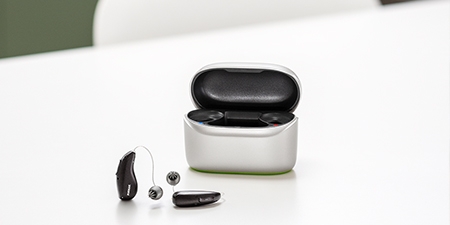Is Ototoxicity Reversible?

Is Ototoxicity Reversible?
10 min
Published July 17, 2025
What is Ototoxicity? Ototoxicity refers to the toxic damage caused to the structures of the inner ear, particularly the cochlea (the organ of hearing) and the vestibular or balance system, resulting in hearing loss and balance disorders. This condition is commonly associated with the use of certain medications and can have a profound impact on an individual's quality of life. In this article, we will explore the prevalence, symptoms, causes, and available treatments for ototoxicity, as well as discuss its effects on hair cells and high-frequency hearing and explain whether it is reversible.
How Common is Ototoxicity?
Ototoxicity is a relatively common side effect of various medications, particularly those used to treat serious bacterial infections and certain types of cancer. Although the prevalence rates vary depending on the specific drugs involved, it is estimated that up to 20% of individuals exposed to ototoxic drugs may experience some degree of hearing loss or balance problems.
The severity of symptoms can range from mild to profound, and may include:
- Sensorineural hearing loss (SNHL): A gradual or sudden loss of hearing, often starting with high-pitched sounds
- Tinnitus: Perception of ringing, buzzing, or other noises in the ears
- Vertigo: A spinning sensation accompanied by dizziness and loss of balance
What Drugs Can Cause Ototoxicity?
Ototoxicity can be caused by a variety of medications, including:
- Aminoglycoside antibiotics: Common remedies for severe bacterial infections such as gentamicin and tobramycin (known as aminoglycosides), have a high potential for being ototoxic or causing aminoglycoside-induced ototoxicity.
- Cisplatin-based chemotherapy: Used in the treatment of various cancers, cis-platinum can cause cisplatin-induced damage to the inner ear.
- Loop diuretics: Medications like furosemide, used to treat conditions such as heart failure and kidney disease, can have ototoxic effects in high doses.
Why Do Loop Diuretics Cause Ototoxicity?
Loop diuretics are a class of medications commonly used to treat conditions such as edema (fluid retention) and hypertension (high blood pressure), heart failure and kidney disease. While they are generally effective and safe when used appropriately, they can cause ototoxicity in some individuals.
The exact mechanism by which loop diuretics cause ototoxicity is not fully understood, but a number of factors are believed to contribute. Here are some proposed mechanisms:
- Disruption of inner ear ion balance which can damage the sensory cells.
- Reduced blood flow to the cochlea: Loop diuretics can cause vasodilation (widening of blood vessels) and decrease blood flow to the cochlea, the part of the inner ear responsible for hearing. Reduced blood flow can lead to ischemia (lack of oxygen) and damage to cochlear hair cells, which are vital for hearing.
- Generation of free radicals: Loop diuretics have been shown to increase the production of reactive oxygen species (ROS), also known as free radicals. Free radicals can cause oxidative stress, damaging the cells and tissues in the inner ear and contributing to ototoxicity
- Genetic predisposition: Some individuals may have a genetic predisposition to ototoxicity from loop diuretics. Genetic factors can influence the metabolism and response to drugs, making certain individuals more vulnerable to adverse effects like ototoxicity.
Hair Cells and High-Frequency Hearing:
The inner ear contains delicate hair cells that are responsible for converting sound vibrations into electrical signals to be interpreted by the brain. These hair cells are particularly susceptible to damage and the ototoxic effects of medications.
As explained previously, these drugs can induce oxidative stress in the cochlea, damaging hair cells and resulting in hearing impairment. High-frequency hearing loss is often one of the earliest signs of ototoxicity because the hair cells responsible for detecting high-frequency sounds are more vulnerable to damage due to being located at the base of the cochlea.
How Do You Treat and Manage Ototoxicity?
The management of ototoxicity involves several approaches, including:
- Discontinuation or adjustment of medication: In some cases, stopping or modifying the dosage of the ototoxic medication may help prevent further damage
- Supportive measures: Assistive listening devices, such as hearing aids or cochlear implants, can help individuals with hearing loss
- Vestibular rehabilition therapy: Balance training exercises may be recommended to improve balance and reduce dizziness
- Audiological monitoring: Regular hearing tests can help identify and monitor the progression of ototoxicity
Testing and Otoacoustic Emissions:
To diagnose ototoxicity, various audiological tests are employed, including pure-tone audiometry and otoacoustic emissions (OAE) testing. OAE testing measures the sounds emitted by the inner ear in response to auditory stimulation. Changes or absence of these emissions can indicate damage to the inner ear.
Is Ototoxicity Reversible?
In many cases, ototoxicity can cause irreversible damage to the inner ear hair cells. Once these cells are damaged or destroyed, they cannot regenerate, leading to permanent hearing loss. The severity and permanence of hearing loss depend on factors such as the specific drug involved, dosage, duration of treatment, and individual susceptibility.
That being said, D-methionine is an amino acid that has shown potential in preventing noise- and drug-induced hearing loss in some studies. The mechanism of action is believed to be associated with its ability to reduce the production of damaging reactive oxygen species (ROS) in the inner ear, which can contribute to cellular damage and hearing impairment².
D-methionine's antioxidant properties may be beneficial in protecting the inner ear from the harmful effects of these drugs. By reducing ROS levels, D-methionine may help safeguard the integrity of the sensory cells and prevent drug-induced hearing loss.
It's important to note that while research on D-methionine's potential for preventing hearing loss is promising, more extensive clinical trials are needed to establish its effectiveness definitively. Additionally, individual responses to D-methionine may vary, and it should not be used as a replacement for the established protocols for monitoring and managing ototoxicity mentioned above².
What Are the Risk Factors For Ototoxicity?
Certain factors may increase an individual's susceptibility to ototoxicity from any of the medications. These include:
- Pre-existing hearing loss: Individuals with pre-existing hearing impairments are at a higher risk of experiencing ototoxic effects
- Genetic factors: Some individuals may have genetic variations that make them more susceptible to ototoxicity.
- Cumulative exposure: Prolonged or repeated exposure to ototoxic medications can increase the risk of hearing loss
- Age: Older individuals may be more vulnerable to the effects of ototoxic medications due to age-related changes in the inner ear.
Conclusions
Ototoxicity is a significant concern for individuals receiving treatment with certain medications. It can result in irreversible damage to the hair cells of the inner ear, leading to hearing loss and balance disorders. While prevention is crucial, early identification and management of ototoxicity can help minimize its impact on an individual's quality of life. Further research is needed to develop strategies for mitigating the risk of ototoxicity and improving treatment options for affected individuals.
If you or someone you know is experiencing hearing problems or is at risk of hearing loss, it is crucial to consult with an audiologist or healthcare professional for proper evaluation and appropriate recommendations. Early intervention and protection can help preserve hearing health and quality of life.
References:
- Albera R, Piumetto E, Cavallero F, et al. (1991). Ototoxicity of high doses of cisplatin. J Laryngol Otol., 105(6):468-472.
- Campbell KC, Meech RP, Klemens JJ, et al. (2007). Prevention of noise- and drug-induced hearing loss with D-methionine. Hearing Research, 226(1-2):92-103.
- Forge A, Schacht J. (2005). Aminoglycoside antibiotics. Audiol Neurootol., 5(1):3-22.
- Rybak LP, Whitworth CA. (2005). Ototoxicity: therapeutic opportunities. Drug Discov Today, 10(19):1313-1321.
- Rizzi MD, Hirose K. (2007). Aminoglycoside ototoxicity. Curr Opin Otolaryngol Head Neck Surg., Oct;15(5):352-7. doi: 10.1097/MOO.0b013e3282ef3c6d. PMID: 17823502.




